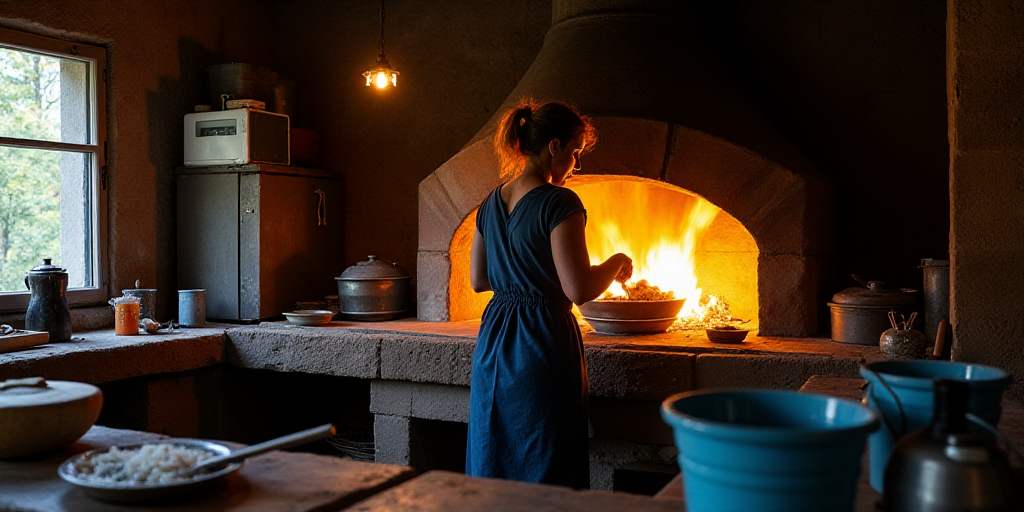The Problem: Traditional Cooking Methods in Rural Mexico
In Mexico, over 28 million people still cook using wood, a practice that not only affects family health but also puts pressure on forest resources and threatens the authentic flavors of rural cuisine. ECOLIFE Conservation, an international non-profit founded in California and active in Mexico since 2017, offers a concrete solution: clean technology, environmental education, and sustainable partnerships with measurable impact.
ECOLIFE’s Project Tsasú: A Sustainable Transformation
The Tsasú project, named after the Mazahua word for “protect,” exemplifies this transformation. By installing 14,950 clean and efficient stoves, ECOLIFE has achieved a 50% reduction in wood usage in rural communities, easing family expenses and decreasing pressure on forests. Today, over 66,000 people in 19 municipalities cook smoke-free, preserving their health and the authentic flavors of their traditional dishes.
Environmental Impact: Reducing Carbon Footprint
The environmental impact is clear: 128,208 tonnes of CO₂ equivalent have been avoided, certified as carbon credits by Gold Standard. These certifications allow companies to responsibly offset their carbon footprint, linking climate action with the well-being of rural communities.
From Open Fire to Clean Stoves: A Stark Contrast
The contrast between traditional open fires and clean stoves is undeniable. A single open fire emits approximately 10.8 tonnes of CO₂ equivalent annually and consumes around 24 kg of wood daily. In contrast, the Patsari stoves promoted by ECOLIFE mitigate about 5.21 tonnes of CO₂ equivalent annually and save approximately 5.62 tonnes of wood per year.
Benefits for Rural Families
For rural families, the benefits are tangible. Teresa San Antonio, a project beneficiary, shares: “Before, I cooked with an open fire that harmed me. Now, I save wood, breathe better, and even started my own tortilla business.”
Environmental Education for Future Generations
Beyond technology, ECOLIFE emphasizes environmental education through the Amamba Echeri project, meaning “Mother Earth” in Purépecha. Through 166 workshops in 85 rural schools across 66 communities, ECOLIFE has trained 5,987 students on topics such as waste separation, biodiversity, and clean energy, sowing environmental consciousness from childhood to protect the territory and its culinary traditions.
Measurable, Scalable, and Collaborative Approach
ECOLIFE’s approach is measurable, scalable, and deeply collaborative. Companies, donors, and volunteers can join transparently through certified carbon credits and direct contributions to seven UN Sustainable Development Goals. Moreover, corporate partnerships and donations are fully tax-deductible.
“We do not promote a paternalistic model towards the communities we operate in; our goal is to co-design programs and solutions with them,” explains Eduardo Ramírez, Operations Director of ECOLIFE Mexico.
Impact: Over 70,000 Beneficiaries Across Mexico
With over 70,000 beneficiaries in 809 localities across Michoacán, the State of Mexico, and Querétaro, ECOLIFE Conservation demonstrates that climate justice also cooks from the local level. Their bet unites community action with global vision to protect forests, health, and the traditional flavors that define Mexico’s rural gastronomy.
Key Questions and Answers
- What is the problem ECOLIFE aims to solve? More than 28 million people in Mexico still cook using wood, affecting family health, putting pressure on forest resources, and threatening the authentic flavors of rural cuisine.
- How does ECOLIFE’s Tsasú project help? By installing 14,950 clean and efficient stoves, ECOLIFE has reduced wood usage by 50% in rural communities, easing family expenses and decreasing pressure on forests.
- What is the environmental impact of ECOLIFE’s efforts? Over 128,208 tonnes of CO₂ equivalent have been avoided, certified as carbon credits by Gold Standard.
- How do clean stoves compare to open fires? A single open fire emits approximately 10.8 tonnes of CO₂ equivalent annually and consumes around 24 kg of wood daily. Clean stoves promoted by ECOLIFE mitigate about 5.21 tonnes of CO₂ equivalent annually and save approximately 5.62 tonnes of wood per year.
- What benefits do rural families experience? Families save wood, breathe better, and can even start new businesses like Teresa San Antonio did with her tortilla business.
- How does ECOLIFE promote environmental education? Through the Amamba Echeri project, ECOLIFE has trained 5,987 students on waste separation, biodiversity, and clean energy, fostering environmental consciousness from childhood.
- What makes ECOLIFE’s approach unique? ECOLIFE’s approach is measurable, scalable, and collaborative, involving companies, donors, and volunteers through certified carbon credits and direct contributions to UN Sustainable Development Goals.






